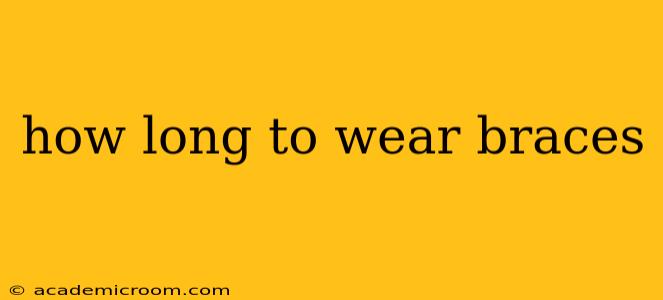Getting braces is a big decision, and one of the first questions most people ask is, "How long will I have to wear them?" The answer, unfortunately, isn't a simple one. Treatment time varies significantly depending on several factors. This comprehensive guide will explore those factors and provide you with a clearer understanding of what to expect.
What Determines Braces Treatment Time?
Several key elements influence the duration of your orthodontic treatment:
-
Severity of the Misalignment: Mild crowding or minor overbites might only require a year or so of treatment. More complex cases involving severe crowding, underbites, overjets, or crossbites will naturally take longer, potentially two to three years or even more.
-
Type of Braces: Traditional metal braces generally offer a predictable treatment timeline. However, Invisalign and other clear aligner systems can sometimes have slightly variable treatment durations depending on patient compliance and the complexity of the case.
-
Patient Cooperation: This is crucial! Regular visits to your orthodontist, diligent brushing and flossing, and adherence to any at-home instructions (like wearing rubber bands) directly impact the speed and success of your treatment. Non-compliance can significantly prolong the treatment process.
-
Age: Younger patients often respond more quickly to orthodontic treatment than older adults. Bone is more malleable in younger individuals, making tooth movement easier and faster.
-
Underlying Medical Conditions: Certain medical conditions can influence the rate of tooth movement. Your orthodontist will take this into account during treatment planning.
How Long to Wear Braces: A Range of Possibilities
While a definitive answer is impossible without a professional assessment, here's a general overview:
- Mild Cases: 12-18 months
- Moderate Cases: 18-24 months
- Severe Cases: 24-36 months or longer
Keep in mind that these are estimates. Your orthodontist will provide a personalized treatment plan and timeline after a thorough examination.
What Happens After Braces Are Removed?
The journey doesn't end when your braces come off. To maintain the results of your orthodontic treatment, you'll need to wear a retainer. Retainers prevent your teeth from shifting back to their original positions. Your orthodontist will explain the specific retainer type and wearing schedule you'll need to follow, which typically involves wearing a retainer for a significant period, often indefinitely, to maintain the results.
How Long Do I Need to Wear a Retainer?
The length of time you need to wear a retainer depends on several factors and is determined by your orthodontist, but generally:
- Initial Phase: You'll likely wear a retainer full-time for several months after your braces are removed.
- Long-Term Retention: After the initial phase, you'll likely transition to wearing a retainer at night or for a specific number of hours per day for several years, or even for life, to prevent relapse.
What if My Treatment Takes Longer Than Expected?
Don't be discouraged if your treatment takes a bit longer than initially anticipated. Every case is unique, and unforeseen circumstances can sometimes arise. Open communication with your orthodontist is key. They will keep you updated on your progress and address any concerns you may have.
Frequently Asked Questions (FAQs)
How much do braces cost?
The cost of braces varies widely depending on the complexity of your treatment, the type of braces you choose (metal, ceramic, Invisalign), and your geographical location. It's best to consult with your orthodontist for an accurate quote.
Do braces hurt?
You might experience some discomfort or soreness, especially in the first few days or weeks after your braces are initially fitted and tightened. This is generally manageable with over-the-counter pain relievers.
Can I eat anything I want with braces?
No. You'll need to avoid hard, sticky, or crunchy foods to protect your braces and avoid damage. Your orthodontist will provide a more detailed list of foods to avoid.
How often should I visit the orthodontist?
Appointments are typically scheduled every 4-6 weeks to monitor progress and make necessary adjustments.
What are the benefits of getting braces?
Beyond aesthetics, braces can improve your bite, chewing function, and overall oral health. Straight teeth are easier to clean, reducing the risk of cavities and gum disease.
Remember, the information provided here is for general knowledge and does not constitute medical advice. Consult with your orthodontist for personalized guidance and a tailored treatment plan. They are the best resource for answering your specific questions and concerns about the duration of your brace treatment.
